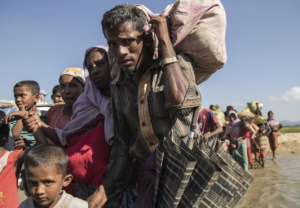China asked to help repatriate Rohingyas
Bangladesh has asked China to help repatriate Rohingya refugees to Myanmar, in a worrying move for almost a million displaced Rohingya.
The deal stems from a visit by China’s Foreign Minister Wang Yi, who as promised better trade ties, investment and support for infrastructure development in the South Asian nation.
The news is the latest episode in a long running tragedy that began in 2017 when a military-backed campaign drove thousands of Rohingya, who are mainly Muslim, across the Myanmar border into Bangladesh.
The United Nations labelled the campaign a “textbook example of ethnic cleansing”.
Both China and Myanmar have been accused of genocide against Muslims, with China defending Myanmar on the global stage.
 The mainly Muslim Rohingya group faces widespread discrimination in Myanmar, where they are despised as interlopers despite having lived in the country for generations.
The mainly Muslim Rohingya group faces widespread discrimination in Myanmar, where they are despised as interlopers despite having lived in the country for generations.
China had used its influence in Myanmar to broker a November 2017 agreement to repatriate about 700,000 Rohingya Muslim refugees who fled persecution in Myanmar in August that year.
Despite attempts to send them back, the refugees refused, fearing danger in Myanmar, which was exacerbated by the military takeover last year.
Mr Yi recently met with Bangladesh Prime Minister Sheikh Hasina and Foreign Minister AK Abdul Momen.
Bangladesh is home to more than a million Rohingya Muslims, who were forced to flee brutal assaults by Myanmar’s military in 2016 and 2017.
In 2021, Rohingya refugees were forcibly removed by Bangladesh authorities from camps on the mainland to a remote so-called ‘prison’ island in the Bay of Bengal.
The Rohingya have demanded that to return, they want a guarantee of citizenship in Myanmar, freedom of movement, repatriation to their home, the return of and reparations for their properties.
They also want international-level security and monitoring.
The Rohingya have lived in Myanmar’s Rakhine state for generations, but many Buddhists consider them recent illegal immigrants from Bangladesh.
In various phases since the 1970s, Rohingya have trickled into Bangladesh to escape persecution by successive military governments and elements from Rakhine Buddhist communities.
The 2016 and 2017 military atrocities in response to Rohingya militant attacks on security forces triggered a mass exodus. The UN has described the military action against the Rohingya as “ethnic cleansing”.
Rohingya author and refugee Habibrahman, who fled repression and torture in his homeland and eventually found safety and a new life in Australia, fears a return to Myanmar would mean further persecution for his people.
My fear is that there will be a new campaign of ethnic cleansing against the Rohingya,” he said.
“They are cleansing our people time after time, and then pushing our people from the country. They are demolishing our historical existence,” Habib said.
“There is an ongoing genocide and I can’t stay silent. We have to make people aware. The international community needs to apply pressure,” he said.
Habib has escaped the Burmese military but he continues to advocate for the hundreds of thousands of his compatriots living in limbo in Bangladesh refugee camps and countless others struggling under the yoke of Burmese government oppression.
He says he fears it might be years before democracy returns to his homeland.
‘Habib’ has written a book about his own story and the suffering of his people to draw attention to their plight.
Titled ‘First They Erased Our Name’ – it tells of Habib becoming an outlaw in his own country and subsequent escape.
First published in French, he hopes it will bring fresh attention to what he describes as historical prejudices behind the plight of his long embattled people.
Habib says he also hopes the book preserves the story of the repression of the Rohingyas for future generations of his people.












